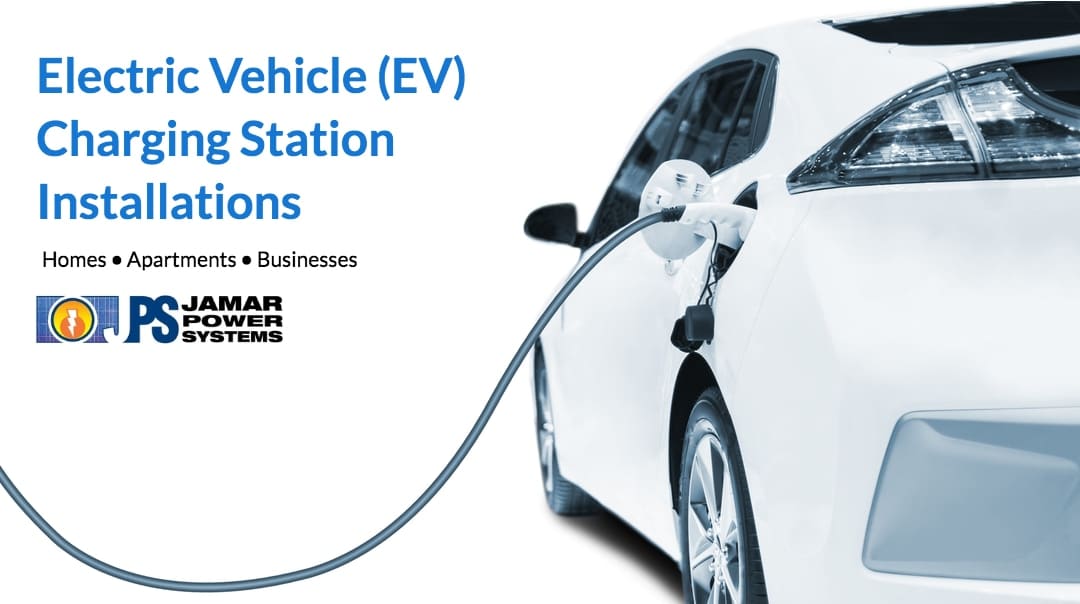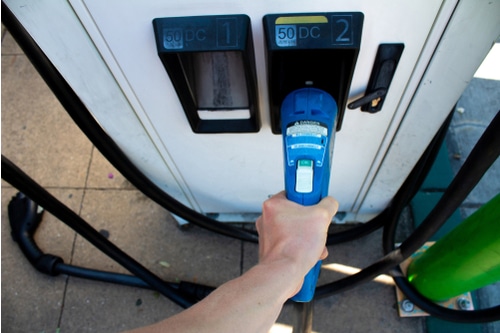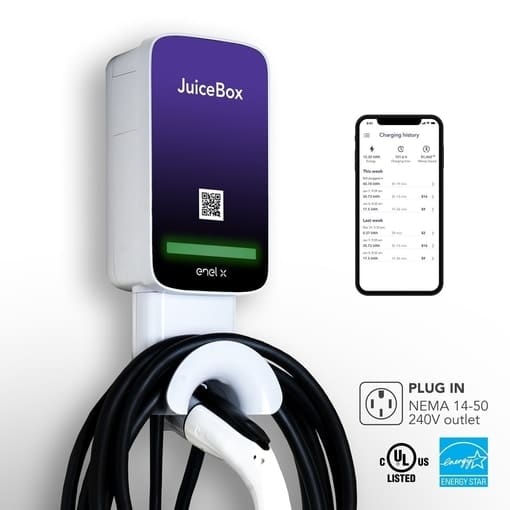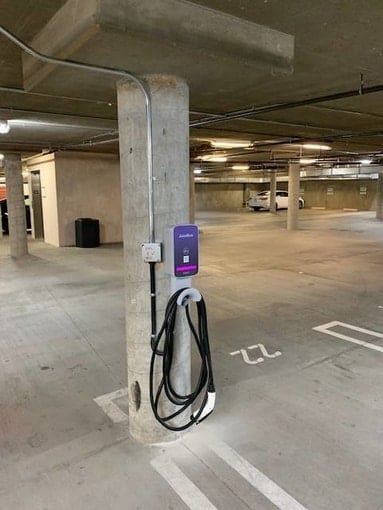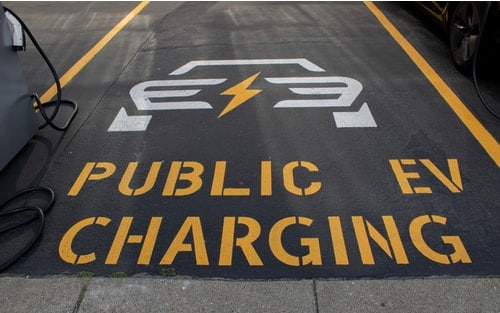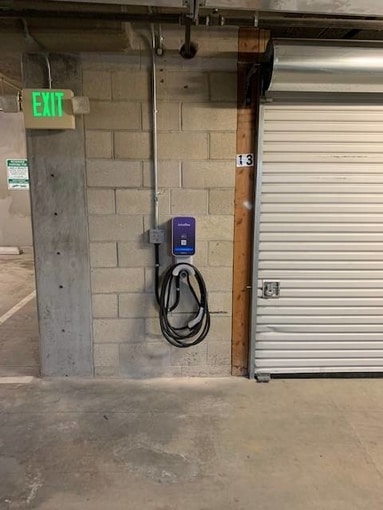Electric vehicle (EV) charging station installation
We install Level 2 electric vehicle (EV) charging stations for apartments, businesses, and homes.
There are three different types of EV charging stations.
Level 1 EV charging stations – charging adds about 5 miles of driving per hour of charging time.
Electric vehicles come with a Level 1 charging station at the time of purchase or lease.
A level 1 charging station is ideal for those who drive less than 40 miles per day.
Level 2 EV charging stations – these are much faster, and depending on battery type, this type of EV charger adds 14 to 35 miles of driving range per hour of charging time.
Level 2 charging stations are used in homes and at many apartment, shopping, and business parking lots.
Level 2 charging stations require 240-volt installation and a dedicated circuit breaker at your main service panel.
Image: DC fast-charging station
DC fast-charging stations – a.k.a. quick charging or supercharging.
Depending on electric vehicle battery type, DC fast charging can add up to 100 miles of range in about 30 minutes of charging time.
DC fast charging stations are only for public charging stations and can charge multiple cars simultaneously.
They’re most commonly found in the parking lots of large shopping centers and major travel centers like airports and rail stations.
DC fast charging is not compatible with every electric vehicle.
DC fast charging requires a CHAdeMO, CCS, or Tesla connector system.
DC fast chargers require a 480-volt connection for installation.
Image credit: enelX.com
Our Level 2 EV Charging Station Installation Service
We sell and install the JuiceBox Pro 32, a level 2 electric vehicle (EV) charging station for homes, apartment buildings, and businesses.
The JuiceBox Pro 32 level 2 charging station is compatible with Tesla and all other electric vehicles.
It’s up to 6x faster charge than a level one charger.
WiFi-enabled and its smartphone app allows you to control charging remotely. Alerts show when fully charged and send reminders to charge. Also works by voice command with Alexa.
The smart grid scheduling feature allows for charging during off-peak times when electric utility costs are lower.
Installation of the JuiceBox pro 32 requires a 240-volt outlet and 50 amp circuit breaker.
At 32 amps, it’s a 7.7 kilowatt EV charging station.
UL & Energy Star certified.
Includes a 25-foot charging cable.
Durable locking feature.
Requires mounting.
Compact and easy to use.
Allows registered drivers to access EV charging stations via a mobile app.
Made in the USA.
Includes a three-year warranty.
Weight 20.7 lbs.
Get fast, affordable, and convenient EV charging with the JuiceBox Pro 32.
Download the JuiceBox Pro 32 electric car charger spec sheet.
Image: recent EV charger installaiton we completed
How much does it cost to install an electric car charger?
Installation costs for level 2 charging stations vary by the installation location, access to the electrical service panel, and several other key factors.
There are also federal income tax credits and state rebates available for EV charging stations to help reduce your costs.
Contact us for an exact quote based on your location.
How much does it cost to charge an electric car at home?
Costs vary widely depending on the vehicle, battery sizes, and the time of day you charge the vehicle due to electric rates varying by time of use.
A rough example would be an average electric utility price of 17 cents per kilowatt-hour (kWh).
A 40-kWh battery with a 150-mile range would cost about 4.42 cents per mile or about $6.63 to charge fully.
Compare that to fueling a 25 mpg gasoline vehicle at an average CA gas price of $3.11 per gallon would cost about 12.44 cents per mile or approximately $18.66 for enough gas to drive about 150 miles.
An electric vehicle costs roughly one-third the expense to fuel a gasoline combustion engine vehicle.
Can I install my own electric car charger?
A level 1 charger comes with your electric vehicle, and in most cases, it doesn’t require any special installation. Level one chargers plug into any standard 120-volt outlet.
A level 2 charger requires a 240-volt electrical outlet and a double-pole circuit breaker.
A level 2 charger requires a EV charging station building permit in the city of San Diego and adherence to local building codes. Building permit requirements may vary by city.
Yes, if you have electrical knowledge and experience and apply for the permits yourself, you may be able to install this yourself.
On the flip side, a 240-volt outlet can be very damaging and dangerous, so we don’t recommend trying it yourself if you don’t already have the extensive electrical skills and knowledge required to do so.
Do public charging stations charge money?
Yes, public electric vehicle charging stations run about 30 cents per kWh to charge on a level 2 public charger or 40 cents per kWh for super-fast DC charging.
At those rates, the same 150-mile range electric vehicle would cost about $12 to fully charge (from empty to full) using a level 2 charger and about $16 for DC fast charging.
Note: Some automakers may provide complimentary public charging at specific locations.
Source: Electric Car Charging Overview by The California Air Resources Board.
Image: recent EV charger installaiton we completed
For more information or to request a quote on an electric vehicle charging station installation, contact us at (619) 448-7770 or use the form below to request that we contact you.
Save more money! Check out our article on using solar power to charge your electric vehicle!
Our Service Area
- 2025 Federal Tax Credit Changes For Solar Panel Systems & Solar Batteries - July 8, 2025
- How Solar Batteries Work - March 4, 2024
- Solar Battery or Generator for Emergency Backup Power? - January 30, 2024

